Spirit Vs Soul Spirituality: Explanations!
In spiritual discourse, the terms ‘spirit’ and ‘soul’ are often used interchangeably, yet they refer to different aspects of our being. The spirit is typically viewed as the eternal essence that connects us to the divine or the universe.
The soul, on the other hand, is thought to be the individual, immortal essence that embodies our personal experiences and emotional life. Recognizing the differences between spirit and soul can enhance our spiritual journey and our understanding of self.
The concept of spirit versus soul is a fundamental aspect of spirituality that helps individuals comprehend their place in the world and their inner workings.
To clarify:
- Spirit: Often considered the breath of life or the divine spark within us, the spirit is our connection to something greater than ourselves. It transcends our physical existence and is associated with universal consciousness.
- Soul: The soul is our personal, unique essence that carries our character, emotions, and memories. It is often seen as the driving force behind our individuality and personal growth.
For example, in meditation, one might focus on the soul for personal healing or self-discovery, while in prayer, one might connect with the spirit to feel a sense of unity with the divine.
Discovering the nuances between spirit and soul empowers us to navigate our spiritual path with greater clarity and purpose, fostering a more profound sense of harmony within ourselves and with the cosmos.

Key Takeaway
5 Aspects: Spirit Vs Soul Spirituality
| Aspect | Spirit | Soul (Spirituality) |
|---|---|---|
| Nature | Immaterial, often associated with vitality | Immortal essence, innermost being |
| Connection | Linked to consciousness, life force | Represents individual’s true self |
| Role | Dynamic, vital force driving life | Eternal, inner core of one’s essence |
| Religiosity | Found in various belief systems | Central to many spiritual teachings |
| Afterlife | Varied interpretations | Often associated with rebirth, ascent |
Definition of Spirituality

The term ‘spirituality’ refers to the search for meaning and purpose in life, often involving a connection to something greater than oneself. It is a deeply personal and individual experience, encompassing a wide range of beliefs and practices.
Spirituality can be expressed through religion, meditation, art, nature, and other forms of personal growth and self-expression. It involves exploring questions about the meaning of life, the existence of a higher power, and the interconnectedness of all things.
This search for transcendence and understanding often leads individuals to seek out a sense of inner peace and harmony. Understanding the definition of spirituality provides a foundation for exploring the origin and meaning of spirit, which we will delve into in the following section.
Origin and Meaning of Spirit
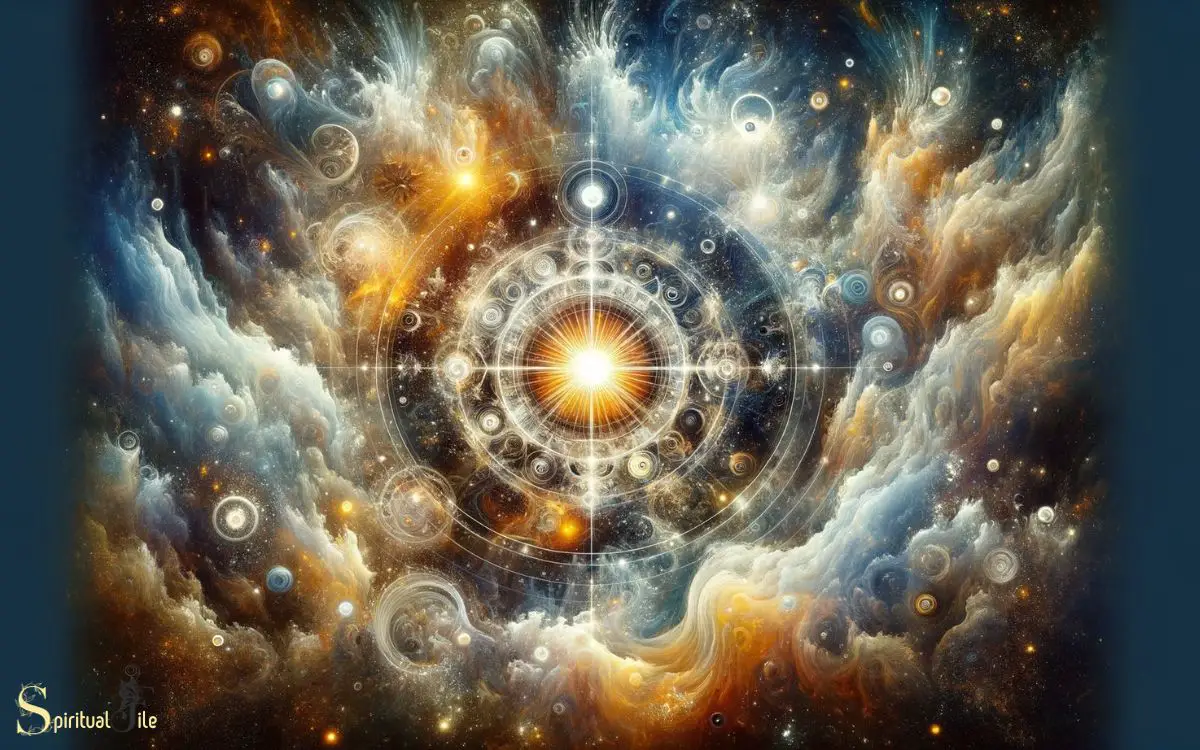
The origin and meaning of spirit are fundamental to understanding its role in spirituality. First, spirit is often perceived as the life force that animates living beings and the natural world.
Second, in a religious context, spirit is frequently associated with the divine and the transcendent, shaping beliefs and practices.
Spirit as Life Force
Originating from ancient beliefs and traditions, the concept of spirit as a life force has been integral to various spiritual practices throughout history.
The idea of spirit as a life force is deeply rooted in the understanding that there is a vital energy or essence that animates living beings.
This life force is often seen as the source of vitality, consciousness, and the driving force behind existence itself.
Across different cultures and spiritual traditions, the concept of spirit as a life force varies in its specifics, but the underlying notion of an animating, vital energy remains consistent. It is often associated with the breath, the unseen essence that sustains life.
Understanding spirit as a life force can provide a profound perspective on the interconnectedness of all living things and the mysterious, transcendent nature of existence.
Spirit in Religious Context
Exploring the origin and meaning of spirit in religious contexts sheds light on its significance in various faith traditions. In religious beliefs, the concept of spirit is foundational and carries profound significance.
Understanding the origin and meaning of spirit in religious contexts provides insights into the core principles of different faith traditions.
Here are four key aspects to consider:
- Divine Presence: The spirit is often seen as the presence of the divine within individuals and the world.
- Guidance and Wisdom: Many religions view the spirit as a source of guidance and wisdom, offering direction and insight to believers.
- Connection to the Sacred: Spirituality in religious contexts often involves the idea of connecting with the sacred through the spirit.
- Eternal Aspect: In various faith traditions, the spirit is associated with an eternal aspect of human existence, transcending physical limitations.
Spirituality and Inner Self
An essential aspect of spirituality lies in understanding the origin and meaning of the spirit as it pertains to the inner self. The concept of spirit originates from various religious and philosophical traditions, representing the core essence of an individual beyond the physical body.
In spirituality, the spirit is often associated with consciousness, higher purpose, and transcendence. It is believed to be the eternal, unchanging aspect of a person that connects to something greater than oneself.
Understanding the spirit in the context of the inner self involves exploring one’s innermost being, values, and beliefs, and seeking a deeper connection with the divine or universal consciousness.
This exploration of the spirit within oneself is a fundamental aspect of spiritual growth and enlightenment.
Transitioning into the subsequent section about the origin and meaning of the soul, it is crucial to delve into the interconnected yet distinct nature of these two concepts.
Origin and Meaning of Soul
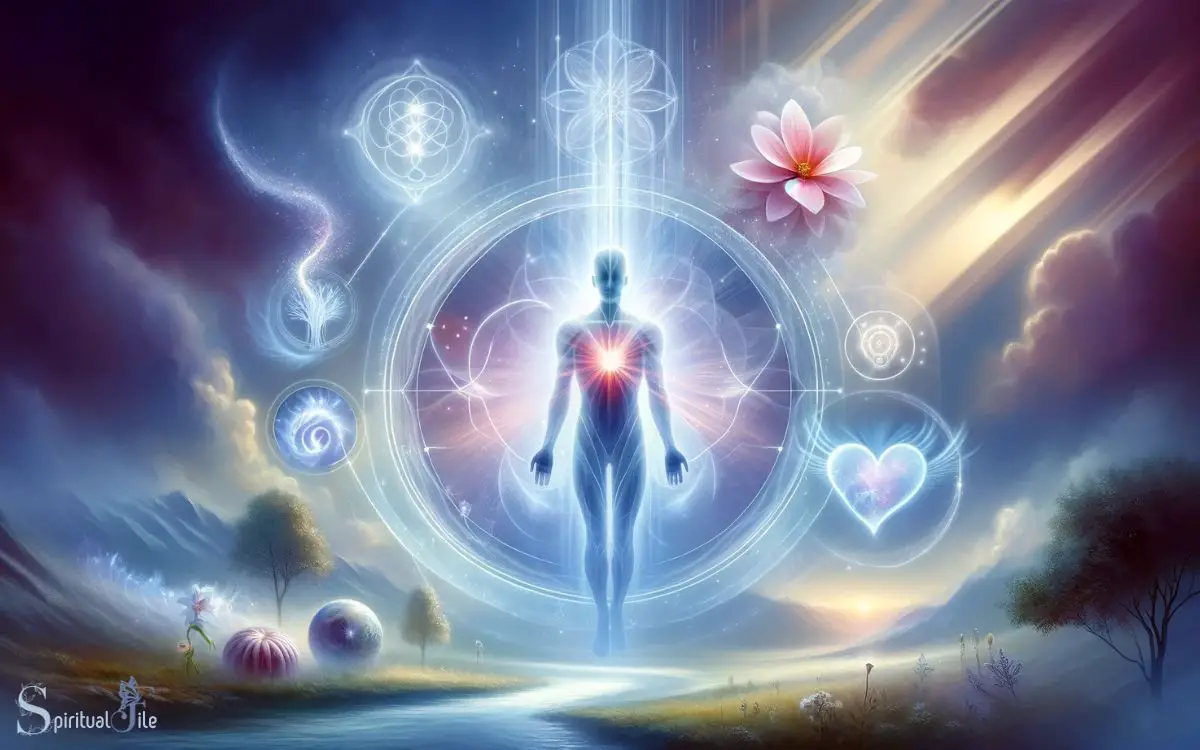
The origin and meaning of the soul can be traced back to various philosophical, religious, and cultural traditions throughout history.
The concept of the soul has been a fundamental aspect of human understanding for centuries, shaping beliefs and practices across different societies.
When exploring the origin and meaning of the soul, it is important to consider the following key points:
- Philosophical Perspectives: The soul has been a central theme in the works of renowned philosophers such as Plato, Aristotle, and Descartes.
- Religious Significance: Various religious traditions, including Christianity, Islam, Hinduism, and Buddhism, have distinct interpretations of the soul’s origin and purpose.
- Cultural Influences: Different cultures have contributed diverse perspectives on the soul, reflecting unique societal values and norms.
- Interconnectedness: The soul is often viewed as the essence of an individual, connecting them to broader existential and spiritual dimensions.
Understanding the historical and cultural significance of the soul provides a foundation for comprehending its role in spirituality and daily life.
Role of Spirituality in Daily Life

Spirituality plays a crucial role in our daily lives, offering a pathway to finding inner peace and connecting with others on a deeper level.
It provides a sense of purpose and meaning, guiding individuals through life’s challenges and fostering a sense of harmony within oneself and with the world around them.
Incorporating spiritual practices into daily routines can enhance overall well-being and promote a more fulfilling existence.
Finding Inner Peace
Finding inner peace through spirituality is a transformative practice that fosters emotional and mental well-being in daily life.
Here are four ways spirituality can help in finding inner peace:
- Mindfulness: Engaging in spiritual practices such as meditation and prayer can help individuals to be present in the moment, reducing stress and anxiety.
- Gratitude: Spirituality encourages a focus on gratitude, which can shift one’s perspective towards positivity and contentment.
- Self–reflection: Through spiritual practices, individuals can engage in self-reflection, gaining a deeper understanding of themselves and their place in the world.
- Connection to a Higher Purpose: Spirituality provides a sense of connection to something greater than oneself, offering comfort and a sense of purpose.
By incorporating these practices into daily life, individuals can cultivate inner peace and emotional well-being.
Transitioning into the subsequent section, spirituality also plays a key role in connecting with others.
Connecting With Others
Engaging in spiritual practices fosters a sense of interconnectedness, playing a pivotal role in shaping meaningful relationships in daily life.
Spirituality encourages empathy, compassion, and understanding, allowing individuals to connect with others on a deeper level. By cultivating a spiritual mindset, individuals become more attuned to the needs and emotions of those around them, leading to more fulfilling and authentic interactions.
This heightened awareness of interconnectedness promotes a sense of unity and belonging, fostering a supportive and nurturing social environment.
Through shared spiritual experiences, individuals can find common ground and build bonds based on shared values and beliefs. These connections not only enrich personal relationships but also contribute to a greater sense of community and collective purpose.
Transitioning to the next section, understanding the connection between spirit and soul further enhances this sense of interconnectedness.
Connection Between Spirit and Soul
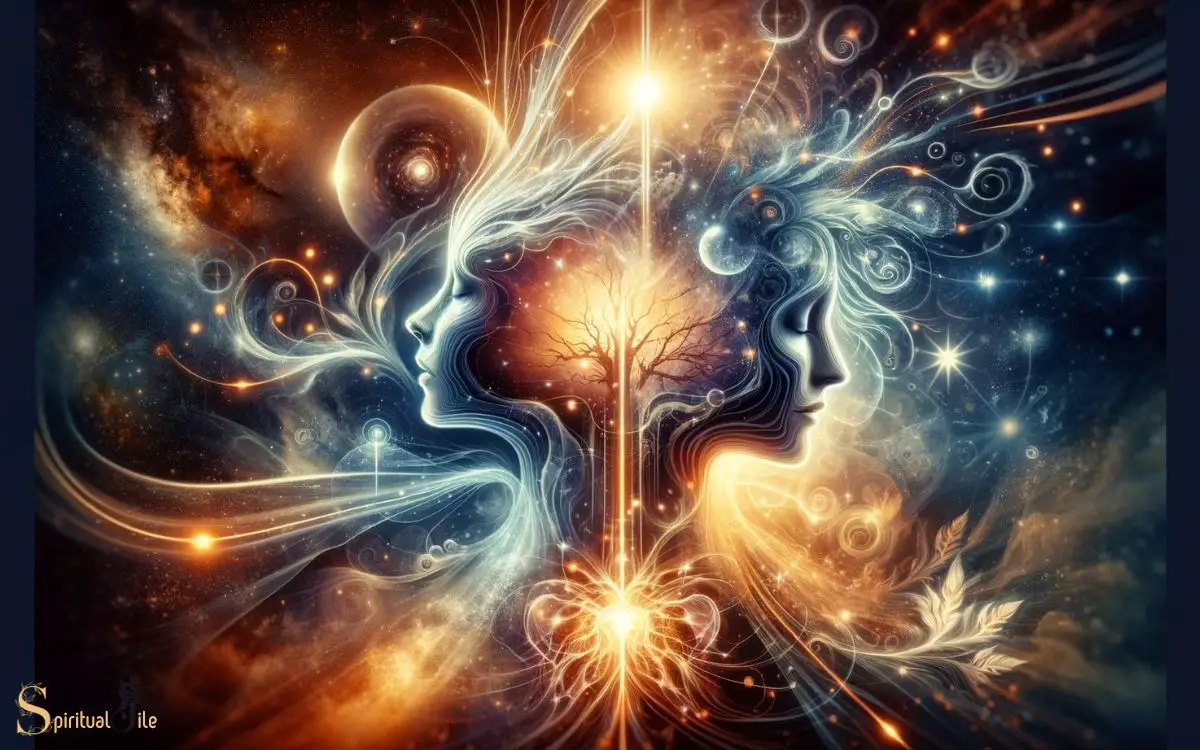
The connection between spirit and soul is integral to understanding the depth of one’s spiritual experience. It is a complex and profound relationship that shapes an individual’s innermost being.
To comprehend this connection, one must consider the following:
- Interdependence: The spirit and soul are interdependent, each influencing and shaping the other in a reciprocal manner.
- Transcendence: The spirit is often associated with transcendent experiences, while the soul is linked to earthly existence, but they are not mutually exclusive.
- Harmony: Achieving harmony between the spirit and soul is essential for inner peace and spiritual growth.
- Integration: Understanding the connection between the spirit and soul involves integrating various philosophical, religious, and psychological perspectives.
Exploring this connection is crucial for individuals seeking a deeper understanding of their spiritual journey.
Practices for Nurturing the Spirit
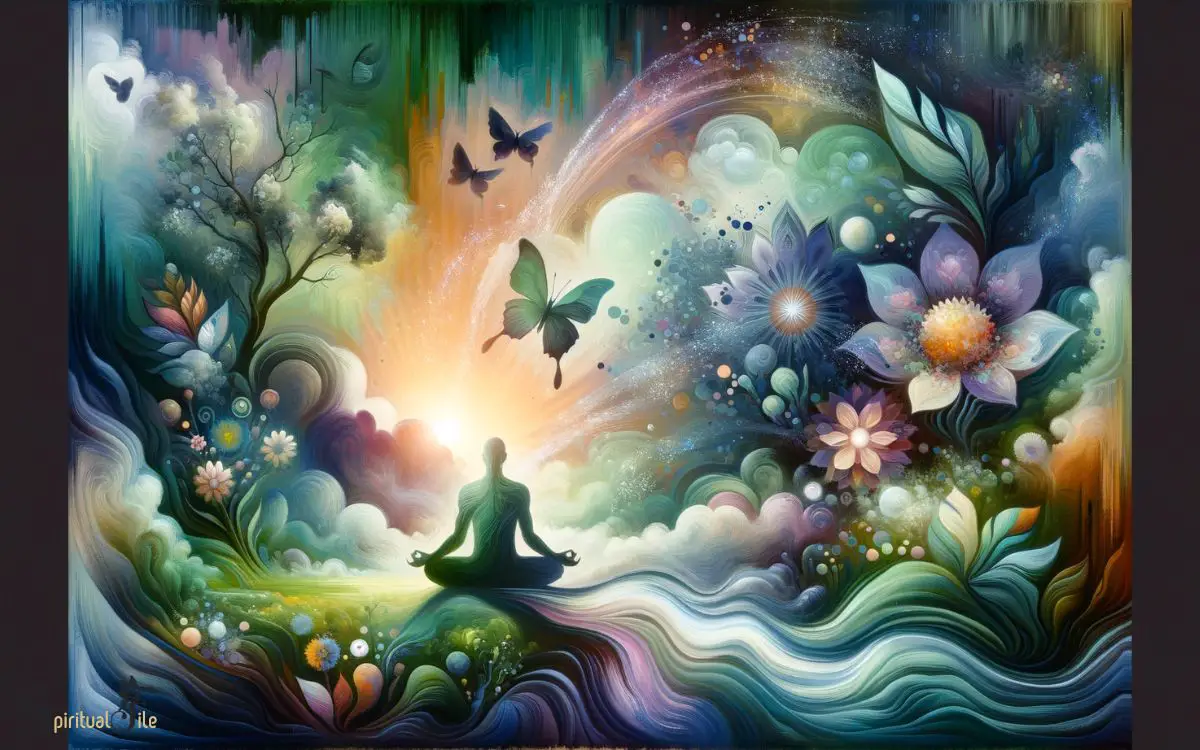
Practicing mindfulness and meditation is an effective method for nurturing the spirit. These practices allow individuals to quiet the mind, become more aware of their inner selves, and connect with their spiritual essence.
In addition to mindfulness and meditation, engaging in acts of kindness and compassion towards oneself and others can also nurture the spirit. The table below provides a visual representation of practices for nurturing the spirit.
| Practices for Nurturing the Spirit | Description | Benefits |
|---|---|---|
| Mindfulness and Meditation | Cultivate present moment awareness and inner peace | Reduced stress, increased self-awareness |
| Acts of Kindness and Compassion | Showing empathy and care towards oneself and others | Enhanced emotional well-being, strengthened relationships |
| Connecting with Nature | Spending time in natural environments | Increased sense of connection, inner calmness |
| Creative Expression | Engaging in artistic or creative activities | Enhanced self-expression, emotional release |
These practices offer individuals valuable tools for nurturing their spirits and fostering a deeper sense of well-being.
Embracing the Wholeness of Spirit and Soul
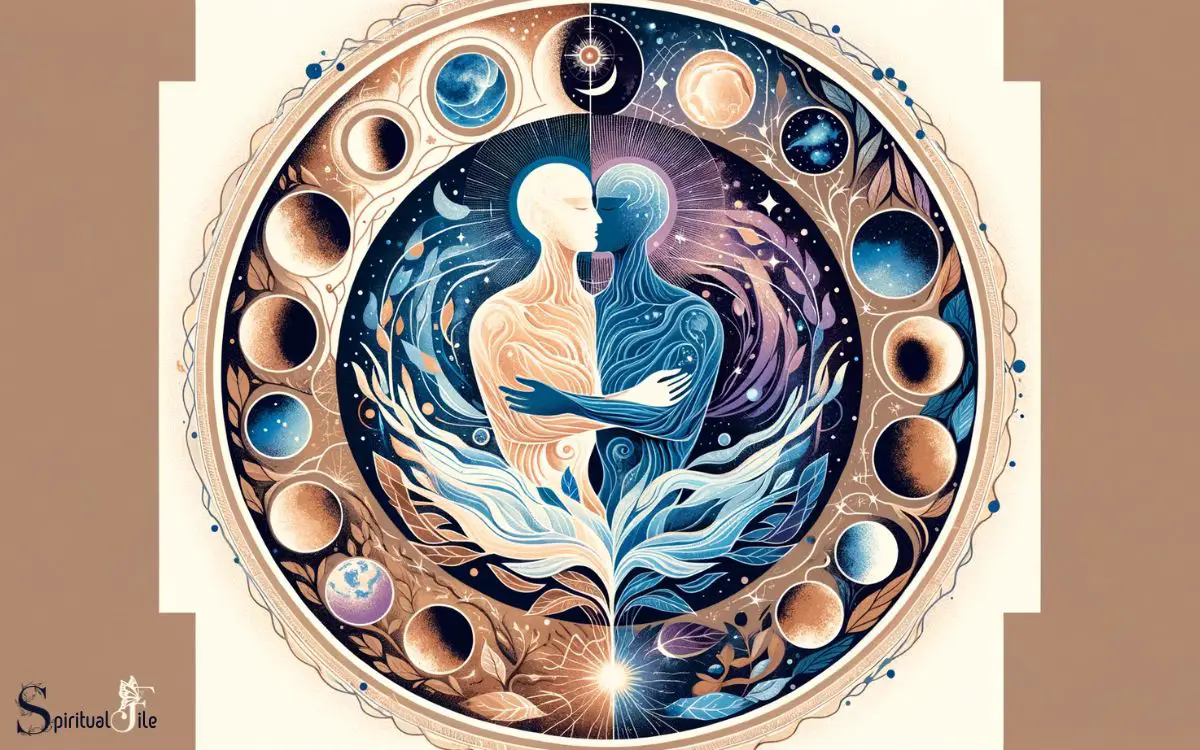
To fully understand the interplay between spirit and soul, it is essential to recognize the inherent interconnectedness of mindfulness and meditation with the nurturing of one’s inner being.
Embracing the wholeness of spirit and soul involves integrating various aspects of our being to achieve a balanced and harmonious state.
Here are four key elements to consider:
- Self-Exploration: Delve into the depths of your being through introspection and self-inquiry.
- Integration of Mind and Body: Cultivate practices that bridge the gap between mental and physical wellness.
- Emotional Healing: Address past wounds and traumas to attain emotional equilibrium and resilience.
- Connection with Others: Foster meaningful relationships that support and nurture your spiritual and soulful growth.
What is the Difference Between Spirituality and Chakra in Terms of Spiritual Concepts?
Spirituality focuses on the belief in something greater, while chakras are energy centers within the body. The concept of spiritual pressure and chakra differences lies in the understanding that spirituality encompasses a broader sense of connection, while chakras specifically refer to the energy within the body.
Frequently Asked Questions
Can a Person Be Spiritual Without Believing in the Existence of a Soul?
Yes, a person can be spiritual without believing in the existence of a soul.
Spirituality can encompass a range of beliefs and practices, and some individuals may focus on personal growth, connection with others, or finding meaning and purpose without specific beliefs about the soul.
How Does Spirituality Differ Between Various Religions and Belief Systems?
Spirituality differs among religions and belief systems in terms of practices, rituals, and beliefs. Each has unique interpretations of spiritual connection, purpose, and the divine.
Understanding these differences can provide insight into diverse perspectives on spirituality.
Is There a Scientific Basis for the Concept of Spirit and Soul in Spirituality?
The scientific basis for the concept of spirit and soul in spirituality is a topic of ongoing exploration.
While spiritual experiences are deeply personal and subjective, some research suggests potential connections between spirituality and aspects of human consciousness and well-being.
Can One’s Spirit and Soul Be in Conflict With Each Other, and if So, How Can This Be Resolved?
One’s spirit and soul can be in conflict due to internal struggles or external influences.
Resolving this conflict involves self-reflection, understanding one’s values, and seeking guidance from spiritual or mental health professionals to align one’s inner being.
What Role Does the Concept of Karma Play in Understanding the Relationship Between Spirit and Soul in Spirituality?
The concept of karma plays a significant role in understanding the relationship between spirit and soul in spirituality.
It is believed that karma influences the experiences and lessons that the spirit and soul encounter on their respective journeys.
Conclusion
The intertwining of spirit and soul in spirituality is a profound and complex concept that transcends individual beliefs and practices.
By nurturing the spirit through various practices and embracing the wholeness of spirit and soul, individuals can tap into a deeper sense of connection and purpose in their daily lives.
The connection between spirit and soul offers a rich tapestry of meaning and significance, inviting individuals to explore the depths of their inner selves with reverence and wonder.






